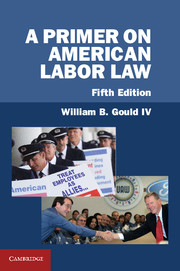Book contents
- Frontmatter
- Contents
- Preface to the Fifth Edition
- Preface to the Fourth Edition
- Preface to the Third Edition
- Preface to the Second Edition
- Preface to the First Edition
- 1 An Overview
- 2 Industrial Relations and Labor Law before Modern Legislation
- 3 The National Labor Relations Act and Related Labor Law
- 4 Unfair Labor Practices
- 5 Establishing the Collective Bargaining Relationship: Organization and Recognition
- 6 Economic Pressure and Bargaining Tactics in the Established Relationship
- 7 Remedies, the Labor Reform Bill of 1978, and the Employee Free Choice Bill of 2009
- 8 Dispute Resolution in the Established Relationship
- 9 The Duty of Fair Representation
- 10 The Public Sector
- 11 Public-Interest Labor Law
- 12 Conclusion
- Index
- References
2 - Industrial Relations and Labor Law before Modern Legislation
Published online by Cambridge University Press: 05 June 2013
- Frontmatter
- Contents
- Preface to the Fifth Edition
- Preface to the Fourth Edition
- Preface to the Third Edition
- Preface to the Second Edition
- Preface to the First Edition
- 1 An Overview
- 2 Industrial Relations and Labor Law before Modern Legislation
- 3 The National Labor Relations Act and Related Labor Law
- 4 Unfair Labor Practices
- 5 Establishing the Collective Bargaining Relationship: Organization and Recognition
- 6 Economic Pressure and Bargaining Tactics in the Established Relationship
- 7 Remedies, the Labor Reform Bill of 1978, and the Employee Free Choice Bill of 2009
- 8 Dispute Resolution in the Established Relationship
- 9 The Duty of Fair Representation
- 10 The Public Sector
- 11 Public-Interest Labor Law
- 12 Conclusion
- Index
- References
Summary
In the United States and in Europe the Industrial Revolution brought competition between employers for distant markets. This created an environment in which labor was increasingly treated as a raw material or a commodity, and it is therefore hardly surprising that a profound sense of discord was generated between workers and their employers. This historical development cannot be divorced from any consideration of industrial relations and labor law in the United States today.
American and European workers sought to band together and to protect themselves against the attempts of business combinations, trusts, and monopolies to reduce labor costs. The courts in the United States and the parliament in England, through their “anticombination” statutes, sought to brand such worker combinations as unlawful conspiracies in restraint of trade – a restraint that might diminish free competition between employers. In the United States the law of conspiracy was criminal law, and indictments were obtained against combinations of workers trying to raise wages. The leading case in which the criminal conspiracy doctrine was applied was the Philadelphia Cordwainers case of 1806.
- Type
- Chapter
- Information
- A Primer on American Labor Law , pp. 9 - 28Publisher: Cambridge University PressPrint publication year: 2013



